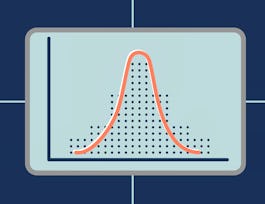The objective of this course is to introduce Computational Statistics to aspiring or new data scientists. The attendees will start off by learning the basics of probability, Bayesian modeling and inference. This will be the first course in a specialization of three courses .Python and Jupyter notebooks will be used throughout this course to illustrate and perform Bayesian modeling. The course website is located at https://sjster.github.io/introduction_to_computational_statistics/docs/index.html. The course notebooks can be downloaded from this website by following the instructions on page https://sjster.github.io/introduction_to_computational_statistics/docs/getting_started.html.


Introduction to Bayesian Statistics
This course is part of Introduction to Computational Statistics for Data Scientists Specialization
Taught in English
Some content may not be translated

Instructor: Dr. Srijith Rajamohan
4,414 already enrolled
Included with 
Course
(41 reviews)
Recommended experience
What you'll learn
The basics of Probability, Bayesian statistics, modeling and inference.
You will also get a hands-on introduction to using Python for computational statistics using Scikit-learn, SciPy and Numpy.
Skills you'll gain
Details to know

Add to your LinkedIn profile
17 quizzes
Course
(41 reviews)
Recommended experience
See how employees at top companies are mastering in-demand skills

Build your subject-matter expertise
- Learn new concepts from industry experts
- Gain a foundational understanding of a subject or tool
- Develop job-relevant skills with hands-on projects
- Earn a shareable career certificate


Earn a career certificate
Add this credential to your LinkedIn profile, resume, or CV
Share it on social media and in your performance review

There are 4 modules in this course
Introduction to the compute environment for the Specialization. The users will be introduced to the Databricks Ecosystem for Data Science. The users can also deploy the notebooks to Binder for setup-free access.
What's included
4 videos1 reading
In this module, you will learn the foundations of probability and statistics. The focus is on gaining familiarity with terms and concepts.
What's included
17 videos7 readings12 quizzes
Tis module will be an introduction to common distributions along with the Python code to generate, plot and interact with these distributions. You will also learn how to perform Maximum Likelihood Estimation (MLE) for various distributions and Kernel Density Estimation (KDE) for non-parametric distributions.
What's included
12 videos2 readings2 quizzes
This module introduces you to various sampling algorithms for generating distributions. You will also be introduced to Python code that performs sampling.
What's included
6 videos2 readings3 quizzes
Instructor

Offered by
Recommended if you're interested in Probability and Statistics

Databricks

University of California, Santa Cruz
Why people choose Coursera for their career




Learner reviews
Showing 3 of 41
41 reviews
- 5 stars
41.46%
- 4 stars
12.19%
- 3 stars
26.82%
- 2 stars
9.75%
- 1 star
9.75%
New to Probability and Statistics? Start here.

Open new doors with Coursera Plus
Unlimited access to 7,000+ world-class courses, hands-on projects, and job-ready certificate programs - all included in your subscription
Advance your career with an online degree
Earn a degree from world-class universities - 100% online
Join over 3,400 global companies that choose Coursera for Business
Upskill your employees to excel in the digital economy
Frequently asked questions
Access to lectures and assignments depends on your type of enrollment. If you take a course in audit mode, you will be able to see most course materials for free. To access graded assignments and to earn a Certificate, you will need to purchase the Certificate experience, during or after your audit. If you don't see the audit option:
The course may not offer an audit option. You can try a Free Trial instead, or apply for Financial Aid.
The course may offer 'Full Course, No Certificate' instead. This option lets you see all course materials, submit required assessments, and get a final grade. This also means that you will not be able to purchase a Certificate experience.
When you enroll in the course, you get access to all of the courses in the Specialization, and you earn a certificate when you complete the work. Your electronic Certificate will be added to your Accomplishments page - from there, you can print your Certificate or add it to your LinkedIn profile. If you only want to read and view the course content, you can audit the course for free.
If you subscribed, you get a 7-day free trial during which you can cancel at no penalty. After that, we don’t give refunds, but you can cancel your subscription at any time. See our full refund policy.



